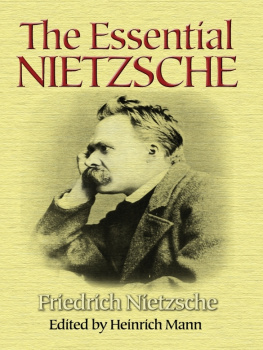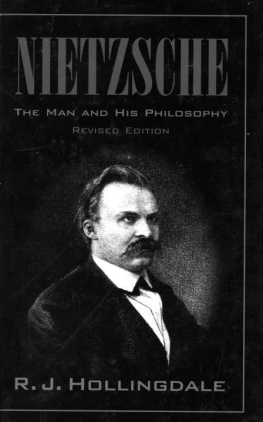Cover

| title | : | Nietzsche's Mirror : The World As Will to Power |
| author | : | Williams, Linda L. |
| publisher | : | Rowman & Littlefield |
| isbn10 | asin | : | 0847697940 |
| print isbn13 | : | 9780847697946 |
| ebook isbn13 | : | 9780585385624 |
| language | : | English |
| subject | Nietzsche, Friedrich Wilhelm,--1844-1900--Contributions to the philosophy of power, Power (Philosophy)--History--19th century. |
| publication date | : | 2001 |
| lcc | : | B3318.P68W55 2001eb |
| ddc | : | 193 |
| subject | : | Nietzsche, Friedrich Wilhelm,--1844-1900--Contributions to the philosophy of power, Power (Philosophy)--History--19th century. |
Page i
Nietzsche's Mirror
Page ii
Page iii
Nietzsche's Mirror
The World as Will to Power
Linda L. Williams
ROWMAN & LITTLEFIELD PUBLISHERS, INC.
Lanham Boulder New York Oxford
Page iv
ROWMAN & LITTLEFIELD PUBLISHERS, INC.
Published in the United States of America
by Rowman & Littlefield Publishers, Inc.
4720 Boston Way, Lanham, Maryland 20706
http://www.rowmanlittlefield.com
12 Hid's Copse Road
Cumnor Hill, Oxford OX2 9JJ, England
Copyright 2001 by Rowman & Littlefield Publishers, Inc.
All rights reserved . No part of this publication may be reproduced, stored in a retrieval system, or transmitted in any form or by any means, electronic, mechanical, photocopying, recording, orotherwise, without the prior permission of the publisher.
British Library Cataloguing in Publication Information Available
Library of Congress Cataloging-in-Publication Data
Williams, Linda L., 1953
Nietzsche's mirror : the world as will to power / Linda L.Williams.
p. cm.
Includes bibliographical references and index.
ISBN 0-8476-9794-0 (alk. paper) ISBN 0-8476-9795-9 (pbk. : alk.paper)
1. Nietzsche, Friedrich Wilhelm, 18441900Contributions to thephilosophyof power. 2. Power (Philosophy)History19th century. I. Title.
B3318.P68 | W55 2001 |
193dc21 | 00038701 |
Printed in the United States of Amerca
 The paper used in this publication meets the minimum requirementsof AmericanNational Standard for Information SciencesPermanence of Paper for Printed LibraryMaterials, ANSI/NISO Z39.48192.
The paper used in this publication meets the minimum requirementsof AmericanNational Standard for Information SciencesPermanence of Paper for Printed LibraryMaterials, ANSI/NISO Z39.48192.
Page v
To Ross
Page vi
Page vii
Contents
| Foreword | ix |
| Acknowledgments | xi |
| Key to the Abbreviations | xiii |
| The Development of Will to Power | 1 |
| Will to Power in the Published Works | 19 |
| Will to Power in the Unpublished Works | 51 |
| Will to Power and Truth | 79 |
| Nietzsche's Magic: It's All Done with Mirrors | 107 |
| Afterword | 129 |
| Notes | 135 |
| Relevant Bibliography | 139 |
| Index | 145 |
| About the Author | 149 |
Page viii
Page ix
Foreword
I first encountered Friedrich Nietzsche when I was an undergraduate philosophy major. I immediately was intrigued by his phrase will to power. It was provocative and mysterious. What could Nietzsche have meant by it? Initially, it seemed to suggest what most first-time readers infer from itsome draconian lust for physical or military power. Luckily, my professor was well versed in Nietzsche interpretation and quickly dispelled these leanings, but what replaced them was rather vague. After that brief first undergraduate fling, I encountered Nietzsche again in graduate school. I knew exactly what I wanted to concentrate on in the graduate seminar on Nietzschewill to power. Although the seminar proved to be a thorough grounding in Nietzsche's later texts, what Nietzsche meant by will to power remained for the most part a mystery; however, the cause of the mystery seemed to belong more to Nietzsche's writing than to the reader. As I continued to delve not only into Nietzsche's texts but into the commentaries on the texts, it became clear that while everyone agreed that will to power was a central, if not the central, idea of Nietzsche's, not everyone agreed on what will to power was.
The purpose of this book is to attempt to sort through this mystery. Quite frankly, what I hope to do is write the kind of book that I would have wanted to read when I first was taken with Nietzsche's famous phrase. Why is it so hard to figure out what Nietzsche meant by it? Why are there conflicting interpretations of it? How did Nietzsche come to invent it? Why is the book The Will to Power unhelpful in answering these questions? While some of the answers to these questions are rather straightforward, they do not seem to be presented all in one place. Some commentaries do not discuss the history of the idea at all, while others discuss only the psychological aspects of it. Some interpreters ignore Nietzsche's unpublished writings, while others focus exclusively on them. Who is right and who is wrong? Instead of pointing fingers, I will show why these splits have occurred, as well as what is gained and lost by going one way rather than an
Page x
other, and direct the reader to more sustained examinations than this one book can offer. For example, there may be some connection between Nietzsche's life and his conception of will to power, but I do not have the time in this book to do a detailed analysis of Nietzsche's life, especially when there are several excellent biographies of Nietzsche already available. In such cases, I will direct the reader to other books on the topic, if the reader wants to explore Nietzsche's life or philosophical ideas from other viewpoints.
So this book becomes, in essence, what a Nietzsche reader might want to know about will to power from both a commentary on Nietzsche's own texts and an analysis of the myriad of interpretations will to power has generated. It is my hope that it will provide a solid introduction to the phrase that will enable the reader to begin to develop an enlightened interpretation of will to power and to have some understanding of the current commentary on it.
The book is divided into five chapters. The first chapter introduces the reader to questions and problems surrounding will to power and addresses the evolution of the phrase in Nietzsche's early texts. How will to power is presented contextually in the works Nietzsche published within his lifetime or authorized to be published before his mental breakdown is the subject of chapter 2. Here I focus on will to power within the context of master and slave morality. Chapter 3 discusses will to power in Nietzsche's unpublished notes and the status of the Nachlass , the unpublished material, and addresses whether will to power is a metaphysical principle. I shall argue that it is not. Chapter 4 attempts to resolve some apparent paradoxes between will to power and Nietzsche's views on truth. The book concludes with some of my speculations on the effects of my interpretation of will to power on other themes of Nietzsche's work, such as eternal recurrence and amor fati (love of fate).
Next page












 The paper used in this publication meets the minimum requirementsof AmericanNational Standard for Information SciencesPermanence of Paper for Printed LibraryMaterials, ANSI/NISO Z39.48192.
The paper used in this publication meets the minimum requirementsof AmericanNational Standard for Information SciencesPermanence of Paper for Printed LibraryMaterials, ANSI/NISO Z39.48192.